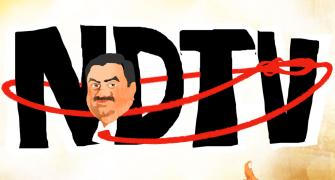
The global spend on business process outsourcing is estimated to be $234 billion in 2005, while global human resources outsourcing (a comparatively new phenomenon) is estimated to touch $67 billion, which is 29 per cent of the global BPO pie.
Out of the $3.6 billion revenue earned from information technology enabled services in 2004 by Indian companies, revenues from HRO services were only 2 per cent or $70 million.
But HRO is projected as the fastest growing segment over the next three years with large-scale offshoring already taking place and larger international players like Fidelity, Exult and Hewitt setting up operations in India.
The revenues in the HR outsourcing space are projected to increase to $3.5 billion by 2008 according to a Nasscom-McKinsey survey.
Even if 10 per cent of HR outsourcing is offshored in the next 5 years, offshore opportunity can be anywhere around $1.4 billion.
The first Indian company to exploit the potential of the HR BPO space is the Chennai-based Secova eServices, co-founded by V Chandrasekharan and Venkat Tadanki.
V Chandrasekharan, Secova's co-founder and chief technology officer, talks on this next big HRO wave and its future growth, in an exclusive interview with Shobha Warrier.
What is HR BPO? How does it function?
Business process outsourcing itself is a fairly new concept. HR is one of the areas where there is significant amount of administrative activity.
HR BPO is getting outsourced to third party providers who can bring in the benefits of knowing the domain. HR outsourcing as an activity has been prevalent in the United States for a fairly long time.
What kind of activities are covered under HR outsourcing?
There are several players in the field. For example, the payroll part of a company is a fairly complex exercise internally. So, if somebody in the US wants to start a company, they look for an outsourcer to take care of the payroll.
They give the entire data to be processed by the outsourcer. Similarly, if you take HR as an activity, it comprises of a group of activities, which include payroll management, training, staffing, benefits administration, travel and expenses management, retirement and benefits planning, risk management, compensation consulting, etc.
In the US context, HR outsourcing is a huge area. For instance, nearly about 29-30 per cent of the outsourcing space is HR. In fact, it is much larger than customer care as an opportunity.
Have the US companies been outsourcing HR for a long time, or is it a new phenomenon?
HR outsourcing has been there in many countries for a long time, particularly in the US. The work was outsourced to companies in the US itself. In the case of HR BPO, you need a front end in the US unlike customer care because if we have to process the pay roll, printing the cheques, filing the tax returns etc. have to take place in the United States itself.
So, it is like having a US front-end led organisation with an off-shoring unit here.
Secova was the first Indian company to do HR outsourcing from India. How did you capture this huge opportunity?
HR BPO is a huge opportunity. Its market size is close to around $60 million. Venkat, the CEO of this company, was the co-founder of Daksh, which was a huge success
We were looking at HR, finance accounting as two significant areas. If we look at the BPO pie, after customer care, HR is the largest. We also believed that HR is new and when we did a detailed analysis, we found that saw that 70-80 per cent of all HR activities are rule based, repeatable and are required to be done for large groups of employees, ideal for off-shoring.
As soon as we got the funding from IL&FS, we set up a centre in Chennai in November 2003.
Were the companies reluctant to offshore HR?
They raised several questions. They wanted to know how we would handle security concerns. Both Venkat Tadanki and Bob Parke, vice president, strategy & business processes, are based in the US.
Bob is a US citizen and has been in the HR domain for a long time, so it was easy to convince the customers. When they meet the customers, they make the customers understand what we are talking about. We have that domain confidence. We also have a US front end organisation now.
In HR BPO, is it very important to have a US front-end office?
It is important to have a US front-end office as it helps in our operation- delivery processes.
You said HR BPO is a huge opportunity for India. Is it because the US-based companies are looking at offshoring as the most cost competitive thing to do?
Yes, we are only in the early part of the cycle. It is not like customer care where so many players are involved right now.
Some of the early indicators are that larger players like Fidelity, Hewitt and Exult have set up their delivery centres in India. That's a clear indicator that a lot of work is going to come this way. I don't think customers are going out and demanding for an offshore vendor. That may not happen.
What is happening is, the moment we talk about the best-shore advantage, it is seen as a good alternative. The flood of companies coming to set up call centres is not there in HR for sure, at least for now.
Gartner Inc says that India has the potential to take at least 10-15 per cent of the US share of $51 billion. Do you feel this is a big opportunity for India to tap?
Absolutely, it is growing at 14 per cent per annum. The other significant factor is that if you take the total HR spend, out of Rs 100, what is offshored is only Rs 6! It is just 6 per cent. That shows the kind of opportunity that can be tapped.
If you look at Nasscom figures, the delivery happening out of India is miniscule. HR outsourcing is happening mostly within the US now. We have to look at the US as the number one target market. That is the biggest regulatory system.
Are you looking at the bigger companies in the US?
No, we are presently looking at only the 'mid-market' segment which itself is worth $20 billion, and under serviced. Mid-segment definition in HR parlance is a company that has 2,000 to 25,000 employees.
So, in some sense, we will have a Fortune 100 company in revenue terms but they fall under the mid-segment as far as HR is concerned when the number of employees is less.
Some of our clients are Fortune 500 and Fortune 1000 companies. Of the $20 billion, there is a market potential of $14 billion for 'payroll' and 'benefits administration' which is a significant opportunity for Indian vendors.







